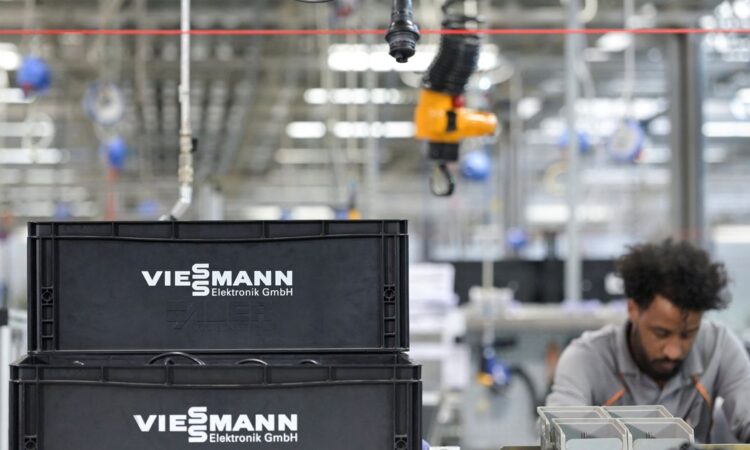
LONDON, April 26 (Reuters Breakingviews) – Knowing when to sell out is a common dilemma among family-owned companies. For 106-year-old German heat pump maker Viessmann it looks like an odd move, given its technology is in demand and at the forefront of the energy transition race. Yet a 12 billion euro sale of its core business to $35 billion American fridge-to-air-conditioning group Carrier Global (CARR.N) looks like a necessary step to stay ahead. It’s also a lesson for German and EU politicians.
Heat pumps may not be the most obvious sector to lead a revival in transatlantic cross-border M&A, down 31% so far this year. The technology may help cut emissions by replacing gas boilers, and has been identified by the European Union as a critical industry, just like wind turbine and battery manufacturing. Brussels is implementing more relaxed rules on state subsidies to avoid losing out to the U.S.’s green technology plan, the Inflation Reduction Act. Privately held Viessmann is riding this trend: its sales have grown at a 15% annual clip since 2020.
Yet creating continental champions is easier said than done. Asian manufacturers such as Daikin (6367.T), Samsung and Mitsubishi are expanding rapidly in Europe and the likes of Viessmann are struggling to retain market share on their home turf. Teaming up with Carrier gives the German group better access to the U.S. market, as well as the benefit of Carrier’s expertise in air conditioning. That will help it keep up with demand for pumps, which is set to skyrocket in Germany due to government incentives.
Carrier’s green pivot isn’t cheap. The group is paying around 17 times the Viessmann unit’s 2023 EBITDA, far more than its own forward multiple of around 11 times, as per Refinitiv data. Still, the price is not egregious: Viessmann’s Swedish peer Nibe Industrier (NIBEb.ST) is valued at 25 times EBITDA including debt. And Carrier reckons it can squeeze out cost savings equivalent to some $200 million. Taxed and capitalised on a multiple of 10, those could be worth some $1.4 billion in today’s money.
That valuation may also reflect the deal’s terms. Viessmann has secured job protections in Germany and a Carrier board seat for current Chief Executive Max Viessmann. But, with some 80% of the purchase paid in cash, the deal effectively sees a prized asset of the future handed over to American control, rather than remaining a European champion. But to thrive, rather than merely survive, such compromise looks like a necessary step.
Follow @pamela_msg on Twitter
(The author is a Reuters Breakingviews columnist. The opinions expressed are his own.)
CONTEXT NEWS
Air conditioner maker Carrier Global has agreed to buy the climate solutions business of German industrial firm Viessmann in a cash-and-stock deal valued at 12 billion euros. The unit makes heating boilers and pumps and is expected to generate 700 million euros of EBITDA in 2023, Carrier said in a statement.
The European heat pump market rose by over a third last year, with a record 3 million units sold in 2022 after government support and soaring fossil fuel prices boosted uptake of the technology, according to the European Heat Pump Association. European Union policymakers are betting on heat pumps to reduce CO2 emissions and cut dependence on imported fossil fuels.
Germany’s heat pump market grew 53% in 2022, Germany’s heat pump association BWP reported in January. BWP called on the German government to quickly implement new regulation that from 2024 will see every new heating system installed in Germany operate with at least 65% of renewable energy sources.
Editing by Neil Unmack and Streisand Neto
Our Standards: The Thomson Reuters Trust Principles.
Opinions expressed are those of the author. They do not reflect the views of Reuters News, which, under the Trust Principles, is committed to integrity, independence, and freedom from bias.






